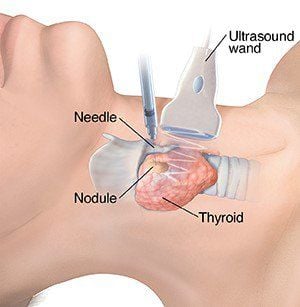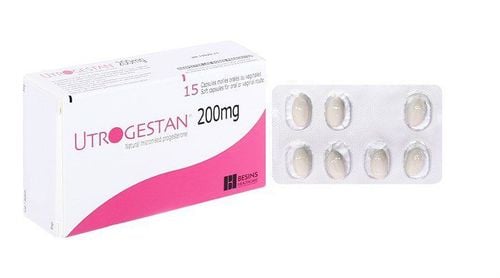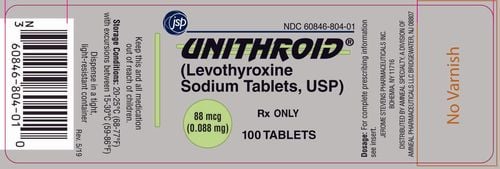This is an automatically translated article.
The article was professionally consulted with Rehabilitation Doctor - Department of General Surgery & Anesthesia - Vinmec Hai Phong International General Hospital.
Toxic adenoma of the thyroid gland is an active multinodular or mononuclear goiter that causes hyperthyroidism in the body that has ruled out other causes of hyperthyroidism. If not detected and treated promptly, the condition of hyperthyroidism will get worse and worse, causing disturbances to many organs in the body such as nerves, heart, movement, etc... But the most severe is acute hyperthyroidism. threaten the patient's life.
1. What is a toxic thyroid nodule?
A toxic adenoma of the thyroid gland is an overactive thyroid with increased production of thyroid hormone due to an active adenoma. Toxic thyroid nodules, also known as toxic nodules, are understood simply as hyperthyroidism caused by thyroid nodules.
2. Causes of toxic adenomas of the thyroid gland
Thyroid nodules can begin as a simple goiter and are very common in the elderly. Risk factors include being female and over 55 years of age. This disorder is rare in children. Most people with toxic thyroid nodules have had goiters with nodules or nodules for many years. Sometimes the thyroid gland is only slightly enlarged and the goiter is undiagnosed.
Some people with toxic thyroid nodules have increased thyroid levels for the first time. This mainly happens after they absorb large amounts of iodine intravenously (intravenously) or orally. Iodine can be used as a contrast agent during a CT scan or cardiac catheterization. Taking medications that contain iodine, such as amiodarone, can also lead to the disorder. Switching from an iodine-deficient diet to one that is high in dietary iodine can also turn a simple goiter into a toxic nodular goiter.

3. Symptoms of toxic adenoma of the thyroid gland
Symptoms of a toxic adenoma can include any of the following signs of hyperthyroidism:
Fatigue, weight loss. Digestive disorders: apple stools, liquid. Temperature disturbances Increased appetite Increased sweating Irregular menstruation (in women) Cramping (hypokalemia). Restlessness, anxiety Weight loss Cardiovascular disorders: palpitations, pulse pulse, trembling hands. Older adults may have less specific symptoms, including:
Weakness and fatigue Palpitations and pain or tightness in the chest Changes in memory and mood Toxic adenoma of the thyroid gland that does not cause protrusion as in Graves' disease - is an autoimmune disorder that results in an overactive thyroid gland (hyperthyroidism).
4. Treatment of toxic adenomas of the thyroid gland
Beta-blockers can control some of the symptoms of hyperthyroidism until the level of thyroid hormone in the body is under control. Certain medications can block or change the way the thyroid gland uses iodine. These drugs may be used in the following situations:
Before surgery or radiation treatment Long-term treatment Radiation therapy may be used when radioactive iodine is given orally , then, it collects in the overactive thyroid tissue and causes damage. In rare cases, a thyroid replacement is needed soon after.
Usually thyroidectomy can be done when:
The goiter is very large or the goiter causes symptoms that make breathing or swallowing difficult Thyroid cancer Needs prompt treatment. Weakness is a disease of the elderly. So, other chronic health problems can affect the condition. However, the condition is usually treatable with medication.

5. Complications of toxic adenoma of the thyroid gland
Heart (heart-related) complications include tachycardia, congestive heart failure, and atrial fibrillation (fast and irregular heartbeat). Another complication of hyperthyroidism is bone loss leading to osteoporosis. An acute thyroid storm is an acute exacerbation of hyperthyroidism symptoms that can occur when a patient has an infection or stress or is predisposed to exacerbation of the disease. Fever, decreased awareness and abdominal pain, gastrointestinal disturbances. In this case, the patient should be hospitalized immediately for treatment. Complications of a large goiter can include difficulty breathing due to pressure on the airways located behind the thyroid gland.
Toxic adenoma of the thyroid gland is a quite dangerous disease and easily causes many complications. Therefore, when the body shows signs of disease, the patient should immediately go to the hospital to be examined by a doctor and advise on the most appropriate treatment direction.
Vinmec International General Hospital is a quality medical unit that you can refer to, when the hospital has good facilities, advanced and modern equipment. In particular, the doctors at the institute have many years of experience in successfully treating patients with toxic thyroid tumors.
Patients can directly go to Vinmec Health System nationwide for consultation, examination or contact the hotline for support.
Please dial HOTLINE for more information or register for an appointment HERE. Download MyVinmec app to make appointments faster and to manage your bookings easily.
Source: pennmedicine.org













